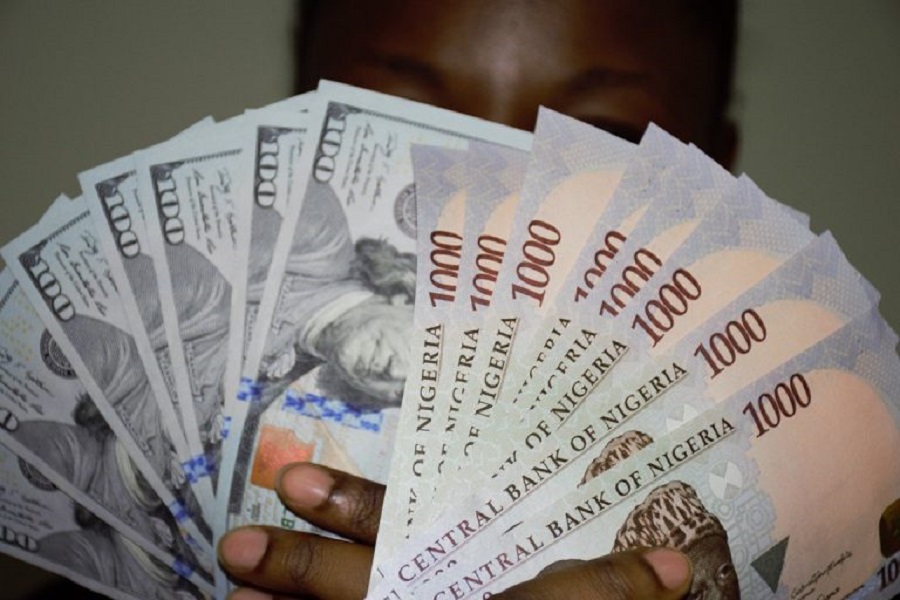Friday, 4th February 2022: The exchange rate between the naira and the US dollar closed at N416.33/$1 at the official Investors and Exporters (I&E) window.
Naira depreciated against the US dollar on Friday with a 0.06% fall to close at N416.33/$1 compared to N416.07/$1 recorded as of the close of trading activities on Thursday, 3rd February 2022. In the same vein, the amount of FX that exchanged hands at the official window well to its lowest in almost 3 months.
Similarly, the exchange rate depreciated at the Peer-to-Peer (P2P) forex market, trading at a minimum of N574.27 to a dollar on Monday morning compared to N572.8/$1 recorded in the previous trading session.
Meanwhile, Naira closed slightly higher at the parallel market on Friday 4th February 2022, to close at N568/$1 compared to N569/$1 recorded in the previous trading session. This is according to information obtained from BDC operators interviewed by Nairametrics.
Nigeria’s foreign reserve reduced marginally by $1.99 million on Thursday to close at $39.982 billion as of 3rd February 2022, representing a 0.005% decline compared to $39.984 billion recorded as of 2nd February.
Trading at the official NAFEX window
The exchange rate at the Investors and Exporters window closed at N416.33/$1 on Friday, 4th February 2022, which represents a 0.06% depreciation compared to N416.07/$1 recorded in the previous trading session
- The opening indicative rate closed at N415.51/$1 on Friday, which represents a 17 kobo improvement compared to N415.68/$1 recorded in the previous trading session.
- An exchange rate of N444/$1 was the highest rate recorded during intra-day trading before it settled at N416.33/$1, while it sold for as low as N410/$1 during intra-day trading.
- Forex turnover at the official window fell significantly by 58.4% to $67.71 million on Friday, 4th February 2022.
- According to data tracked by Nairametrics from FMDQ, forex turnover at the I&E window decreased from $162.7 million recorded on Thursday 3rd February 2022 to $67.71 million on Friday 4th January 2022. This represents the smallest daily turnover at the market since November 16th 2021.
Cryptocurrency watch
Global flagship crypto asset, bitcoin gained 0.91% in the early hours of Monday, indicating a positive start to the new week following a 0.64% marginal gain recorded in the previous trading session. As of press time, bitcoin was trading at $42,783.
- The crypto industry market capitalization also gained 1.23% on Monday morning, representing a $23.26 billion gain to stand at $1.93 trillion. Also, second most capitalized crypto asset, Ethereum gained 0.93% at the same time to trade at $3,085.
- The market is beginning to rebound from its record losses recorded in previous weeks as bitcoin has now recovered above $40,000 having fallen down the threshold twice last month.
- Meanwhile, Nigeria’s peer-to-peer transactions rose by 16% on an annual basis. Nigeria’s P2P volumes on two major P2P platforms (Paxful and Localbitcoins) currently stand at $400 million, followed by Kenya with more than $160 million and South Africa with $117 million.
Crude oil market maintains bullish trend
Crude oil prices maintained bullish position on Sunday, trading at record levels as Brent gained 2.37% to close at $93.27 per barrel at the end of trading activities on Sunday. Similarly, West Texas Intermediate recorded a gain of 2.26% to close at $92.31 per barrel, while Nigerian crude, Bonny Light gained 4.05% to close at $95 a barrel.
On the other hand, Natural gas slumped by 6.46% to close at $4.572 per barrel. The rally at the market has been attributed to ongoing worries about supply disruptions fueled by frigid U.S. weather and ongoing political turmoil among major world producers
External reserve
Nigeria’s external reserve declined slightly by 0.005% on Thursday, 3rd February 2022 to close at $39.982 billion, which represents a decline of $1.99 million from the $39.984 billion recorded as of the previous day.
The continuous decline in the country’s reserve level can be attributed to the Central Bank’s intervention in the official market in ensuring the stability of the exchange rate. Although it is worth noting that the decline has been very minimal in recent times, largely attributable to the rally in crude oil prices.
Nigeria’s external reserve gained $5.99 billion in the month of October, as a result of the $4 billion raised by the federal government from the issuance of Eurobond in the international debt market.
Nigeria’s reserve level declined by $481.37 million in January 2022 following the $66.17 million dip recorded in the previous month. Year-to-date, Nigeria’s reserve has declined by $537.66 million despite the rally at the global crude oil market.














